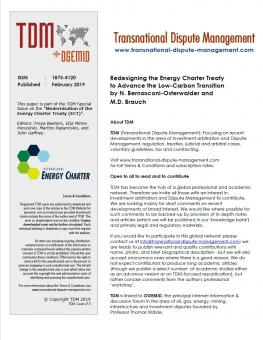
Redesigning the Energy Charter Treaty to Advance the Low-Carbon Transition
This paper discusses practical ways to overhaul the Energy Charter Treaty to bring it in line with international law commitments with respect to climate change and sustainable development.
The Energy Charter Treaty (ECT), if revised, could have a particularly important role to play, given the importance of the energy sector in relation to both contributing to global warming and providing climate change solutions.
Unlike most other investment treaties and chapters in trade agreements covering all sectors and measures indiscriminately, the ECT covers only activities in the energy sector. It covers a large range of activities relating to oil, gas, and coal, as well as wind and solar power and other renewable energy sources.
At a time when climate change is a top priority and the most pressing environmental and developmental issue for the future of our planet, a revised ECT should, from a normative perspective, play an important role in the transition from fossil fuel-based energy to renewable, clean energy.
In order to ensure mutual supportiveness between environmental and economic goals set at the international level, the ECT should be redesigned to bring it in line with—and help achieve—states’ international commitment under the Paris Agreement under the United Nations Framework Convention on Climate Change (UNFCCC).
This paper discusses the ECT and the Paris Agreement regimes and their inter-relationship, highlighting how they pull in different directions. It presents three building blocks that could be adopted in a revised ECT to align it with the Paris Agreement: encouraging low-carbon energy investments; discouraging carbon-intensive energy investments; and ensuring a just transition to low-carbon economies and societies. Finally, it proposes ways to reform the ECT through a climate lens as well as through a broader socioeconomic sustainability lens.
This paper was originally published in the Transnational Dispute Management (TDM) 1 (2019) "Modernisation of the Energy Charter Treaty (ECT)" Special Issue as N. Bernasconi-Osterwalder & M.D. Brauch; "Redesigning the Energy Charter Treaty to Advance the Low-Carbon Transition," TDM 1 (2019), available at https://www.transnational-dispute-management.com/article.asp?key=2632
Republished with permission from TDM.
You might also be interested in
Artisanal and Small-Scale Mining of Critical Minerals
This report examines the potential for artisanal and small-scale mining (ASM) to take an expanded role in the global supply of critical minerals.
Europe’s Dash for Gas in Africa puts Private Profits First
Europe’s demand for gas is contributing to expansion of LNG projects in Mozambique, Nigeria, and Senegal. This favours the interests of European oil and gas companies over those of African countries, a new report shows.
What Will Happen at COP 29?
Talks at the 2024 UN Climate Change Conference (COP 29) will range from defining a way forward on finance through a new collective quantified goal (NCQG) to mitigation, and loss and damage. Ahead of negotiations in Baku, IISD’s Earth Negotiations Bulletin Team Lead Jennifer Bansard examines the agenda and breaks down what to watch as eyes turn to Azerbaijan.
December 2024 | Carbon Minefields Oil and Gas Exploration Monitor
In November 2024, 23 oil and gas exploration licences were awarded across five countries, with Russia granting the licences that account for the largest portion of embodied emissions.